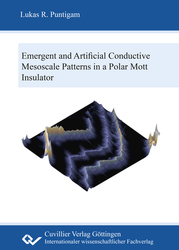| Fachbereiche | |
|---|---|
| Buchreihen (97) |
1381
|
| Nachhaltigkeit |
3
|
| Gesundheitswesen |
1
|
| Geisteswissenschaften |
2369
|
| Naturwissenschaften |
5408
|
| Mathematik | 229 |
| Informatik | 319 |
| Physik | 980 |
| Chemie | 1364 |
| Geowissenschaften | 131 |
| Humanmedizin | 243 |
| Zahn-, Mund- und Kieferheilkunde | 10 |
| Veterinärmedizin | 108 |
| Pharmazie | 147 |
| Biologie | 835 |
| Biochemie, Molekularbiologie, Gentechnologie | 121 |
| Biophysik | 25 |
| Ernährungs- und Haushaltswissenschaften | 45 |
| Land- und Agrarwissenschaften | 1005 |
| Forstwissenschaften | 201 |
| Gartenbauwissenschaft | 20 |
| Umweltforschung, Ökologie und Landespflege | 148 |
| Ingenieurwissenschaften |
1795
|
| Allgemein |
98
|
|
Leitlinien Unfallchirurgie
5. Auflage bestellen |
|
Erweiterte Suche
Emergent and artificial conductive mesoscale patterns in a polar Mott insulator
Lukas Raimund Puntigam (Autor)Vorschau
Leseprobe, PDF (160 KB)
Inhaltsverzeichnis, PDF (37 KB)
The global demand for increased computational power is fuelled by the miniaturisation of electronic components. Next to this more Moore approach, more than Moore and beyond CMOS expand on existing technologies and on devices with fundamentally different principles of operation. Mott based devices are introduced under the scope of beyond CMOS, with a potentially reduced energy consumption during operation in comparison to semiconductor-based devices. In such devices quantum properties are utilised to control the current flow. Mott insulators are especially intriguing as they fulfil all conditions to be metallic but show properties of insulating materials. Up to now the properties in Mott-insulators have typically been controlled at the macroscopic length scale, which leaves room for miniaturisation. It is apparent that such a versatile material class has untapped potential with regards to utilisation of its quantum properties.
This work investigates a novel class of materials, beyond CMOS, the lacunar spinels, where the electrons are localised on molecular clusters instead of atomic sites. The target system of this thesis, GaV4S8, is such a lacunar spinel and shows a structural transition, which gives rise to ferroelectric domain walls that could be used as nanoscale functional objects. Here, potential 2D conducting pathways are investigated to push Mott science to the nanoscale. These pseudo 2D properties are characterised using a range of surface sensitive techniques to understand their origin, a critical first step for functionalisation. Transferring the knowledge gained on these structures allowed for an in-situ control of the current flow at the nanoscale, pushing the boundaries of research in this quantum material.
| ISBN-13 (Printausgabe) | 9783689520007 |
| ISBN-13 (E-Book) | 9783689520786 |
| Buchendformat | A4 |
| Sprache | Englisch |
| Seitenanzahl | 152 |
| Umschlagkaschierung | matt |
| Auflage | 1. |
| Erscheinungsort | Göttingen |
| Erscheinungsdatum | 13.06.2024 |
| Allgemeine Einordnung | Dissertation |
| Fachbereiche |
Physik
|
| Schlagwörter | quantum materials, beyond CMOS, Mott-insulator, Motttronics, ferroics, multiferroics, ferroelectrics, ferroelectric domain walls, functional domain walls, conductive domain walls, structural domain walls, mesoscale pattern, Jahn-Teller effect, structural phase transition, surface reconstruction, spontaneous strain, metal-to-insulator transition, polarisation, atomic force microscopy, scanning probe microscopy, piezoresponse force microscopy, conducting atomic force microscopy, scanning electron microscopy, focused ion beam, point I(V) spectroscopy, bulk resistance, lacunar spinel, spinel, GaV4S8, strain implantation, cracks, scratches, trenches, in-situ control, nanoscopic, Aizu’s model, electronic conductivity, space-charge limited conduction model, lamella, scanning X-ray diffraction microscopy, Quantenmaterialien, Beyond-CMOS, Mott-Isolator, Motttronik, Ferroika, Multiferroika, Ferroelektrika, ferroelektrische Domänenwände, funktionale Domänenwände, leitfähige Domänenwände, strukturelle Domänenwände, Mesoskalige Strukturen, Jahn-Teller Effekt, struktureller Phasenübergang, Oberflächenrekonstruktion, spontane Belastung, Metall-Isolator Übergang, Polarisation, Rasterkraftmikroskopie, Rastersondenmikroskopie, Piezomode-Kraftmikroskopie, Strom-Spannungsmikroskopie, Rasterelektronenmikroskopie, Ionenfeinstrahlanlage, Punkt-Strom-Spannungs-Spektroskopie, Volumenwiderstand, lakunarer Spinell, Spinell, GaV4S8, Belastungsimplantation, Risse, Kratzer, Gräben, In-situ-Kontrolle, nanoskopisch, Aizu-Modell, elektronische Leitfähigkeit, Modell der begrenzten Raumladungsleitung, Lamelle, Röntgenbeugungsmikroskopie |








